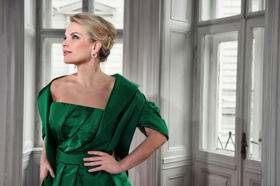Review: Elina Garanca, Wigmore Hall

![]() If there are golden voices, the instrument of Elina Garanca isn't among them. Dusky like a claret, the mezzo-soprano's pervasive, pure timbre emerges with the strength of a tree bark; equally, the luscious lilt of gently pouring molten bronze.
If there are golden voices, the instrument of Elina Garanca isn't among them. Dusky like a claret, the mezzo-soprano's pervasive, pure timbre emerges with the strength of a tree bark; equally, the luscious lilt of gently pouring molten bronze.
Unlike many singers whose propulsive voices resonate with slight, yet noticeable quivers - a shaky quality that some erroneously call the execution of vibrato when it constitutes a natural tremor - Garanca performs almost any piece with an untarnishable integrality of sound, even in moments when her largely irreproachable technique is challenged.
Beginning with Schumann's "Five songs from Myrten", Garanca masked half of her volume to establish the intimate, anti-operatic setting of chamber music. Most of her interpretations of these gentle works - written as Schumann's wedding present to his unerringly devoted bride, fellow composer Clara - unravelled purposely in unpretentious inner monologues.
Precisely weighing her use of dynamics, Garanca moulded her crescendos in this instance to sound pensively dreamy, as throughout her silvery realisation of the three words "vor dem Haus" - "outside the house" - in the song "Der Nussbaum"; a poetic contemplation on the walnut tree outside the lovers' dwelling.
In certain moments - such as the start of the excited avowal of love, "Lied der Braut" ("Song o the bride") - Garanca's voice hastened a little too much, somewhat obscuring her meaning with evident breaths and a steely resolve to defy the most difficult parts.
Despite an unquestionably studious approach, there were instances in which she could have lent her words more tenderness - such as in "Seh' ich ihn allein," ("I see only him,") in the song "Seit ich ihn gesehen" from Schumann's "Frauenliebe und -leben" cycle - a series of songs about a woman's love for a man that span their meeting, courtship and his sudden death.
But by the time she reached another set of vocal love letters, her instrument was freed from any figurative shackles - finally emerging uninhibited and effervescent. With the liberty of Wagner's operatic "Wesendonck Lieder", of which two songs were written specifically as preparatory studies for his score of Tristan and Isolde, Garanca held back no fervour.
Performing music set by the composer to the poems of his mistress, Mathilde Wesendonck, she unleashed exquisitely slow-growing crescendos on words such as "Ew'gen Spur" - "Eternity's footprint", and "heil'ge Natur" - "holy Nature".
Likewise, Garanca managed to exert a gentle cautiousness in her performance of the song "Träume" ("Dreams"). Initially sculpting the work to sound like the diffident prayer of a girl for the first time in love, little by little she expanded her sound to eventually release an unabashedly potent, fully sustained outburst of total, relentless euphoria.
Enrobing the spirit of Mahler's amorous "Rückert Lieder" in a wondrous trance, Garanca executed languorous themes with the subtle changes in volume of varying whistles across the night wind. "Um Mitternacht", a soliloquy that ends with a prayer, was here performed like a reverential address to the heavens; "Liebst du um Schönheit" - "If you love for beauty" - beamed with elated crescendos.
The most famous of the songs, "Ich bin der Welt abhanden gekommen" - "I am lost to the world," which is frequently performed as a mournful lament despite its expression of hope, here found the character with which Mahler envisaged it. Garanca's version was a heady conversation with the self; ultimately a moment of self-resignation.
A less celestial affair, Malcolm Martineau's accompaniment switched dynamics and tempi according to the differing styles of the works, but remained episodically dicey. His tendency to swiftly snatch his hands away from the piano ended up truncating several chords before they'd reached complete maturity. At times, such little details took away from the romanticism of the music.
A gloriously prepared recitalist, Garanca unequivocally established herself yet again as a supreme performer of not only aria-like masterpieces, but less grandiose works of a smaller magnitude; the kind that fit the cosy backdrop of a chamber music concert hall.
Through her easy exploration of contrasting moods and colours, without the obstruction of a costume or a set that certain singers find protective, it was evident that there was no barrier between the singer and the public.
Photo credit: Paul Schirnhofer/DG
Videos
